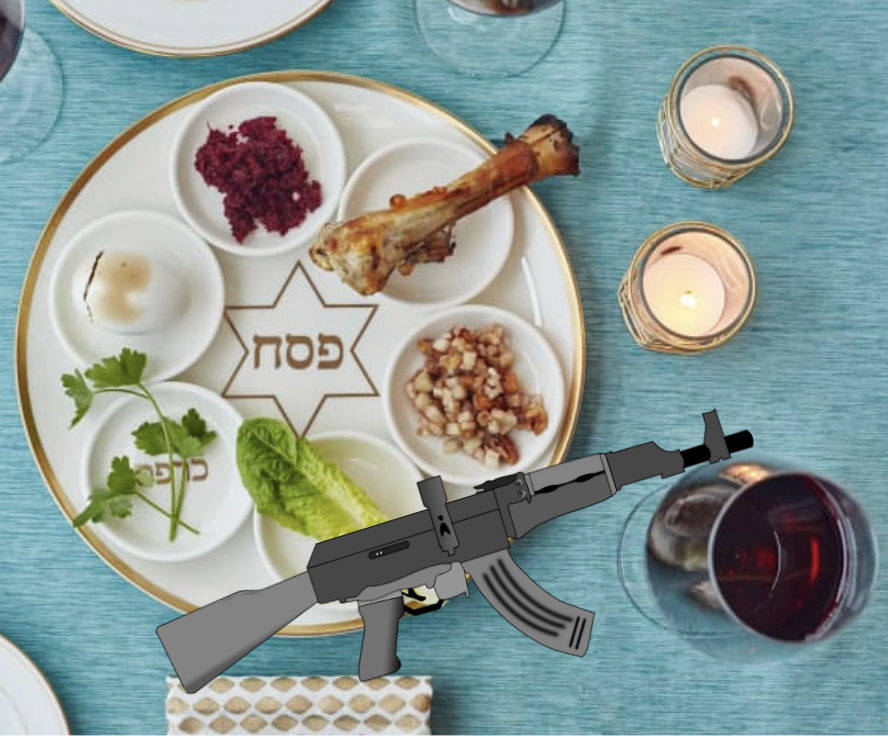| "Why is this night different from all other nights?" This Passover question echoes across history; it's especially poignant this year amidst war, antisemitism and so much more tugging at the Jewish spirit. It's easy to forget that we are one people sharing a single human garment. This year reminds that there is no true Jewish freedom in mere individualism however comfortable, or in an echo chamber however reassuring, or in silencing, or in mere blame and finger pointing. This year demands that we all make space at our seder tables – and in our hearts – for the missing and diverse, what most comforts and what most challenges. After all, the only way we ever can be truly free is together. |

By Rabbi David Evan Markus
It's that time again, and we've never quite been here before – not in our lifetimes, at least.
As Passover approaches, our people prepare to go free anew from bone-crunching bondage and soul-crushing hopelessness. When we gather for Passover, we'll invoke Torah's ancient call (Exodus 13:8) to regard ourselves as if each of us personally was freed from the clutches of Pharaoh in Egypt (in Hebrew, the "Narrow Place"). We'll celebrate anew our liberation from the taskmaster's lash. We'll invoke ancient words and symbols titrated through time, culture and family legacy. We'll sing ancestral songs, feast on recipes passed through the generations, and proclaim in hope L'shanah ha-ba'ah b'Yerushalayim – "Next Year in Jerusalem."
And with extraordinary poignance, we'll ask why this night is different from all other nights – in this year that is different from all other years.
Some will approach Passover this year in triumphal resolve and gratitude that our people are existentially resilient and strong, come what may. They'll be inspired anew by Passover's deep relevance in past centuries of Jewish struggle and strife. Others might approach Passover this year looking over shoulders, wondering if, as The Atlantic's timely article proclaimed, "the golden age of American Jews is ending." When the Haggadah prompts us to open the doors and welcome all who are hungry, ambivalence or fear might find some of us thinking twice.
Some will watch the Mideast news and feel validated in how they already approach this season. Israeli hostages in Gaza will be analogized to ancient slaves in next-door Egypt, worthy of rescue at all costs as the fulfillment of a sacred covenant. Others will watch the Mideast news as a gut-punch challenge to who we are, with pain and righteous indignation that anyone's freedom comes at the expense of others. As Talmud twice records, God rebuked the angels who celebrated the Egyptian host's demise in the sea: "The works of My hands are drowning and you sing Me praises?" (B.T. Megillah 10b, B.T. Sanhedrin 39b).
Some will see resurgent antisemitism as living proof of the Haggadah's declaration in V'Hi She'amdah: "In every generation there are [those who] arise to destroy us, but the Holy Blessed One delivers us from their hands." Others will see resurgent antisemitism as a core challenge to God, theology and spiritual life. They will approach Passover more as a cultural experience than a spiritual one.
Some will approach Passover with anger, others with love. Some with hope, others despair. Some very sure, some very unsure – and some, like the Haggadah's simple child who doesn't yet know to ask, might opt out entirely unless someone reaches in.
These many contradictory snippets (and more) might barely begin to depict the complexity of this year's Passover season. These contradictions might sit next to each other at a seder table, or swirl among a family or congregation. Amidst them all, some might find it difficult to know that we are one people.
Yet we are, in fact, one people – especially now. There was no litmus test in Egyptian slavery. History's flames of hate never asked what kind of Jew one might be. We are one people to those who hate or let hate flourish. All the more today, we must be one people to each other and together. Meanwhile, covid and climate change never asked anyone's religion, race or creed (though impacts do vary with socioeconomic status – tragically). All the more today, we must live the truth of our creed that ultimately there is but one human family.
These words are easy to say, but sometimes exceptionally hard to fulfill – especially now. But consider this: there is no genuine Jewish freedom in our mere individuality however comfortable, or in an echo chamber however reassuring, or in silencing, or in blame and finger pointing. Especially this year, each of us must make space at our seder tables – and in the seder table of our hearts – for the missing and the diverse, what most comforts and what most challenges, the liberation we crave and the liberation we most fear.
I don't know how it all comes together. I suspect none of us do, but we mustn't let it stop us from extending ourselves with all we've got – because that's who we are called to be. Maybe that's why Torah recounts that all the Children of Israel were liberated together, all jumbled in our diversity, all mixed together. None of us were free until all of us were free. So too now.
For the most difficult of questions throughout the ages, tradition resolves to leave them for Elijah the Prophet – the same Elijah we invoke on Passover. Perhaps, if we all do our parts together, we'll hasten that longed-for time when everyone truly, truly will be free.
It's that time again, and we've never quite been here before – not in our lifetimes, at least.
As Passover approaches, our people prepare to go free anew from bone-crunching bondage and soul-crushing hopelessness. When we gather for Passover, we'll invoke Torah's ancient call (Exodus 13:8) to regard ourselves as if each of us personally was freed from the clutches of Pharaoh in Egypt (in Hebrew, the "Narrow Place"). We'll celebrate anew our liberation from the taskmaster's lash. We'll invoke ancient words and symbols titrated through time, culture and family legacy. We'll sing ancestral songs, feast on recipes passed through the generations, and proclaim in hope L'shanah ha-ba'ah b'Yerushalayim – "Next Year in Jerusalem."
And with extraordinary poignance, we'll ask why this night is different from all other nights – in this year that is different from all other years.
Some will approach Passover this year in triumphal resolve and gratitude that our people are existentially resilient and strong, come what may. They'll be inspired anew by Passover's deep relevance in past centuries of Jewish struggle and strife. Others might approach Passover this year looking over shoulders, wondering if, as The Atlantic's timely article proclaimed, "the golden age of American Jews is ending." When the Haggadah prompts us to open the doors and welcome all who are hungry, ambivalence or fear might find some of us thinking twice.
Some will watch the Mideast news and feel validated in how they already approach this season. Israeli hostages in Gaza will be analogized to ancient slaves in next-door Egypt, worthy of rescue at all costs as the fulfillment of a sacred covenant. Others will watch the Mideast news as a gut-punch challenge to who we are, with pain and righteous indignation that anyone's freedom comes at the expense of others. As Talmud twice records, God rebuked the angels who celebrated the Egyptian host's demise in the sea: "The works of My hands are drowning and you sing Me praises?" (B.T. Megillah 10b, B.T. Sanhedrin 39b).
Some will see resurgent antisemitism as living proof of the Haggadah's declaration in V'Hi She'amdah: "In every generation there are [those who] arise to destroy us, but the Holy Blessed One delivers us from their hands." Others will see resurgent antisemitism as a core challenge to God, theology and spiritual life. They will approach Passover more as a cultural experience than a spiritual one.
Some will approach Passover with anger, others with love. Some with hope, others despair. Some very sure, some very unsure – and some, like the Haggadah's simple child who doesn't yet know to ask, might opt out entirely unless someone reaches in.
These many contradictory snippets (and more) might barely begin to depict the complexity of this year's Passover season. These contradictions might sit next to each other at a seder table, or swirl among a family or congregation. Amidst them all, some might find it difficult to know that we are one people.
Yet we are, in fact, one people – especially now. There was no litmus test in Egyptian slavery. History's flames of hate never asked what kind of Jew one might be. We are one people to those who hate or let hate flourish. All the more today, we must be one people to each other and together. Meanwhile, covid and climate change never asked anyone's religion, race or creed (though impacts do vary with socioeconomic status – tragically). All the more today, we must live the truth of our creed that ultimately there is but one human family.
These words are easy to say, but sometimes exceptionally hard to fulfill – especially now. But consider this: there is no genuine Jewish freedom in our mere individuality however comfortable, or in an echo chamber however reassuring, or in silencing, or in blame and finger pointing. Especially this year, each of us must make space at our seder tables – and in the seder table of our hearts – for the missing and the diverse, what most comforts and what most challenges, the liberation we crave and the liberation we most fear.
I don't know how it all comes together. I suspect none of us do, but we mustn't let it stop us from extending ourselves with all we've got – because that's who we are called to be. Maybe that's why Torah recounts that all the Children of Israel were liberated together, all jumbled in our diversity, all mixed together. None of us were free until all of us were free. So too now.
For the most difficult of questions throughout the ages, tradition resolves to leave them for Elijah the Prophet – the same Elijah we invoke on Passover. Perhaps, if we all do our parts together, we'll hasten that longed-for time when everyone truly, truly will be free.


 RSS Feed
RSS Feed